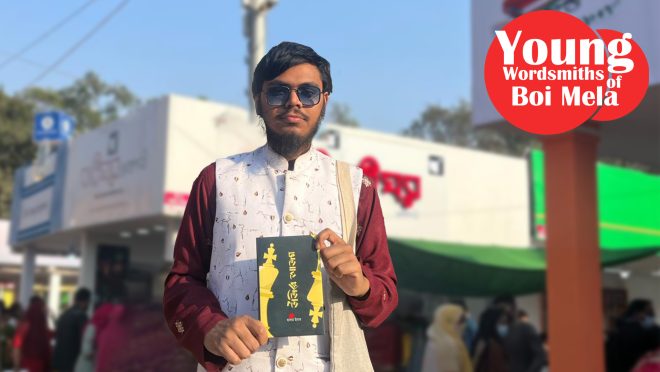History, maps, and fabricated stories - Uzire Azam revives a Sultanate through pages
Young Wordsmiths of Boi Mela
Related News
History, maps, and fabricated stories - Uzire Azam revives a Sultanate through pages

Young Wordsmiths of Boi Mela, a TBS Graduates exclusive series, follows the journey of some of the young authors of Boi Mela. This week we explore Uzire Azam, a historical thriller that unravels the secrets of a forgotten Sultanate, bridging the past and present with a tale of intrigue and identity.
Historical thrillers, still rather unexplored in this side of the Bengali community, often tell cautionary tales as old as time. This niche of thinly veiled social commentaries not only ignites interest in history but also helps reflect on the present.
One young author, Hasan Enam, decided to encapsulate the prospects of this niche in his latest offering ‘Uzire Azam’. This historical thriller, set in a forgotten sultanate, serves as a bridge connecting the past with the present, offering a metaphorical exploration of contemporary tales through the lens of history. In this chapter of “Young Wordsmiths of Boi Mela”, TBS Graduates reached out to the author to discuss the ideas behind his work, as well as inspirations and aspirations.
TBS: What is the synopsis or plot of your book? What themes did you cover?
Enam: The synopsis goes like this- In a land where secrets and lies bind the fate of its people, a Sultan is imprisoned, his identity unknown to all. A mysterious rider cloaked in shadows carries the map of the Saheli kingdom, holding the key to untold stories. Meanwhile, the kingdom’s vizier, Uzir, weaves a web of deception, turning the kingdom’s grief into a grand celebration to conceal a perilous secret.
As the narrative unfolds, a new yet familiar figure emerges, altering the course of the story. But wait, this is someone we all know! A familiar face in a different guise. Just like that, the familiar kingdom will start changing rapidly. Uzire Azam is the story of a Sultanate lost in history. It is a metaphorical novel. The story of the present is told in the frame of a historical thriller.
TBS: Are there any particular authors who had a significant impact in your choice of this theme or genre?
Enam: I can mention influences of Franz Kafka, Gabriel Garcia Marquez and Shahidul Zahir.
TBS: What type of reader did you have in mind while writing the book? What is your target audience niche?
Enam: University-going students are my target audience. But readers of any age or type can read it.
TBS: Since you have authored a few books, you have been practising writing for quite a while. At what point of your writing journey did you decide that you want to take on the challenge of writing an entire book?
Enam: The decision to publish books stemmed from the urge to tell stories. I have often noticed that the stories I want to share are comparatively larger in scope, ones that cannot be published in magazines or newspapers. To do justice to the story, there needs to be a book.
TBS: Publishing a book in the Boi Mela isn’t just about writing it. How was your journey from the pages to the stall?
Enam: The preparation for publishing a book starts at least three to four years prior. First, a small idea, then some characters – this way the story builds up slowly but gradually. Till it comes to the keyboard, it changes course, takes new turns. This is a cherishable journey.
TBS: What are some must-have qualities in a student to be able to go down this path? How did you tackle your own struggles when starting out?
Enam: The biggest quality required to be able to publish books whilst still in student life is communication skill. From where the book is to publish, what kind of publication goes well with the quality of my content, how to talk to the publishers – these are essentials without which the ride gets bumpier. In most cases, it seems that young writers are scammed. They have to pay to publish. And even after paying, they cannot do it properly. Then there are eager publishers who are waiting to provide the youth a chance. But the writers can’t seem to reach out to them.
TBS: What is one specific advice you would give to aspiring student writers who are just starting their journey?
Enam: That they stay confident about their work. I hope they succeed in achieving all the means necessary to cultivate this self-confidence. Because it makes the rest of the journey easier.
TBS: Do you think we need more young and young-adult writers, since the popular writers seem to be from an older generation? What kind of opportunities do you think the young writers should get to be able to reach their full potential?
Enam: A lot of the popular writers started out young. After being in the game for long, they reached fame. Even if we don’t count fame as a metric, I would still say the youth should participate in writing more and more. The more the new writers, the more the ideas and newer stories. And the most important thing now is to contain the contemporary within the writing – something the youth can pull off the best.
Motivated by the positive feedback he’s received, Enam says he does not plan on halting his writing journey anytime soon.
‘Uzire Azam’ can be spotted in the Batighar Stall (No. 455-456) of the Amor Ekushey Boi Mela.


